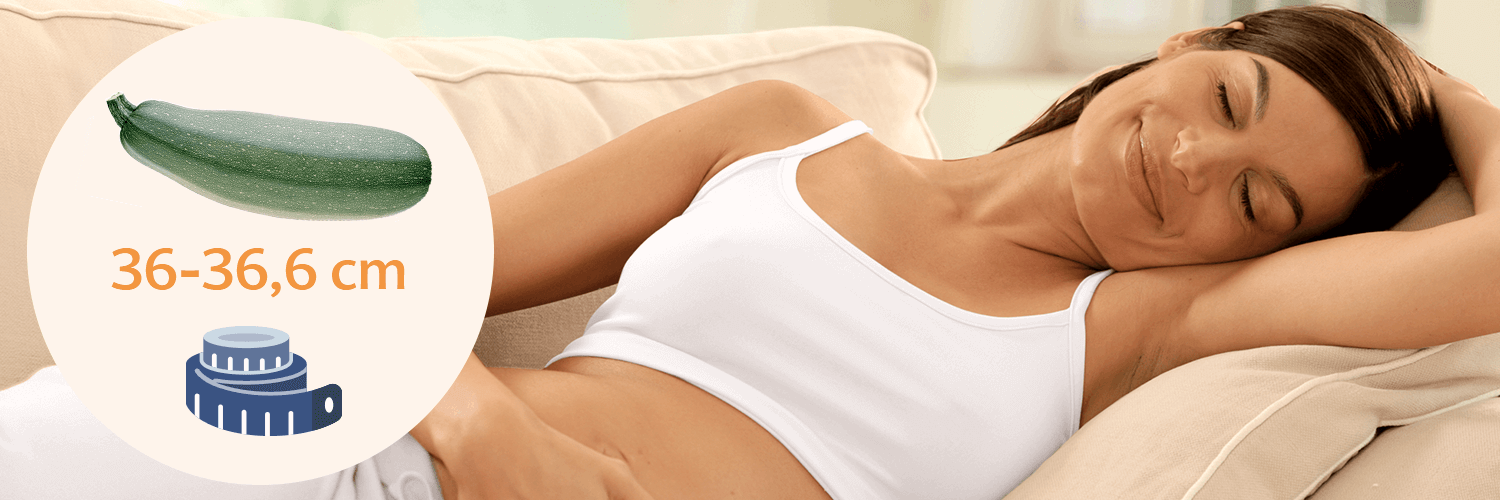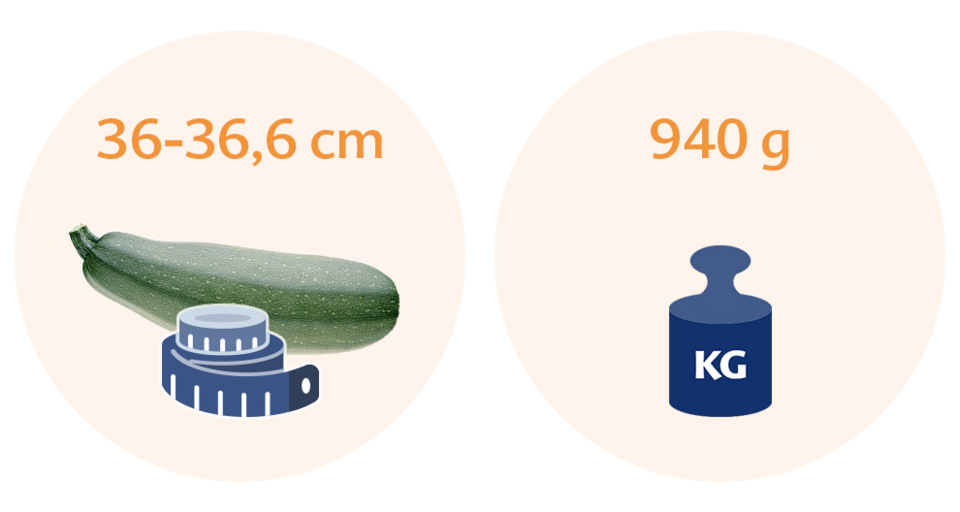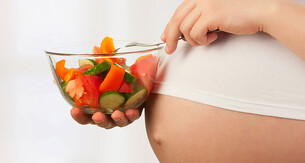With an average size of between 36 and 36.6 centimetres, your baby is about as big as a large courgette. They now weigh around 940 grams, almost a kilo, making them almost the same weight as a bag of flour. Over the next few weeks, their weight will triple and their length will increase significantly, so that they reach a size that makes them ready for birth and able to survive outside the womb.
Pregnancy weeks:
Week 27 of pregnancy: Your baby develops their sense of taste

Size of your baby in week 27
Your baby’s development
What it’s like for the mum-to-be in week 27
Top tips
Questions you may want to ask your doctor or midwife
Size of your baby in week 27

Your baby’s development
In week 27, your baby can do more than simply distinguish between light and dark with their eyes: they can open and close them with their eyelids, and they’ll constantly practise this opening and closing between now and the birth.
Your baby’s first taste buds are now forming on their tongue, which means they can taste flavours in the amniotic fluid they drink. The flavours they get depend on what you eat – some of the flavours in your food reach the amniotic fluid and give it a distinctive taste.
The development of their eyesight and taste is closely related to the development of their brain. Its surface was previously flat, but the first grooves now begin to form in week 27, which enable thought processes and sensory perception.
The proportions of your baby’s body are also getting closer and closer to how they’ll be when they’re born. For example, their head is now growing more slowly as the rest of their body “catches up”. As yet they have no subcutaneous fat, which is why the skin on their body still looks very wrinkly. However, this will change as more fat cells develop, so that these wrinkles will largely have disappeared by the time they’re born. Over the next few weeks, between now and the birth, they’ll experience a huge growth spurt, which you’ll see clearly when you have your next appointments.
Your baby has now settled into a rhythm of waking and sleeping, although unfortunately it doesn’t coincide with your waking and sleeping patterns – they’ll often be active and moving around when you want to lie down or sleep. The reason for this is simple: your body is preparing for the birth of your child. The hormones involved in giving birth are active (though in a weakened form) at the exact times that you’re resting, and your baby reacts to this influence. It keeps them awake and stimulates physical activity, which will be as important for birth as the work your body will be doing.
By this stage, your baby’s lungs are so sufficiently developed that their chances of survival if born premature are very high. Mechanical ventilation would still be required if they were born in week 27, but there is now no significant risk of life-threatening disabilities.
What it’s like for the mum-to-be in week 27
Your bump is growing, and you’ll be feeling good – though your baby will be keeping you on your toes, as they’ll be active and moving around at precisely the times you want to get some rest or sleep. They’ll also be finding space harder and harder to come by in the womb when practising their movements, which you’ll notice when they kick against the abdominal wall. These kicks can be painful, and you’ll feel it more, of course, if you’re expecting twins.
The round ligaments that support your womb come under a lot of pressure as it increases in size and your baby moves around. Pulling sensations in your abdomen and lower back pain are the most common symptoms you’ll experience as a result of this in week 27. You shouldn’t be feeling nauseous anymore, as your body has now largely adapted to the hormones and other changes caused by pregnancy.
Common signs and symptoms
Bigger appetite
You’ll now find that you have a bigger appetite and frequently get cravings as your body and your baby demand the extra calories and nutrients they need. When shopping, try to buy healthy, low-sugar snacks that don’t contain any empty calories, such as fruit, nuts, yoghurts and smoothies. Keeping an eye on your weight is important – although a little bit of what you fancy every now and then is also OK.
Noticing the practice contractions
Unfortunately, you’ll find that sleep and other rest periods continue to be disrupted. Your body is preparing for birth, and you’ll feel practice contractions (your uterus hardening for around half a minute at a time) every now and then, especially when you’re trying to rest. In fact, this is good practice for when the baby comes, as your sleep will regularly be disturbed by your baby demanding food or attention. These practice contractions won’t cause you any pain, in contrast to the contractions that bring on labour and dilate your cervix. Women who have previously experienced labour will feel these practice contractions less than first-time mums.
Top tips
- If you haven’t done so already, start thinking about where you want to give birth.
- If you get cravings, make sure you eat healthy snacks such as fruit and vegetables as much as possible.
- To meet your increased daily vitamin C requirements, you can eat:
1 cup of strawberries,
1 kiwi,
1 cup of steamed broccoli or
½ red paprika - There’s a simple exercise you can do to give yourself a quick energy boost: make sure you’re sitting comfortably, rub your hands together a few times, cover your eyes with your hands and say to yourself: ‘I feel refreshed and relaxed.’ This will do both you and your baby good.
Questions you may want to ask your doctor or midwife
Choosing where to give birth
From week 27 on, you’ll start thinking hard about where you want to give birth. Your midwife can tell you about the midwifery units and birth centres in your locality. You also have the option of arranging a freelance midwife, who will be with you in the clinic from the moment the process of giving birth starts. This gives you peace of mind: she’ll look after you in the weeks leading up to the birth and will know exactly what you need and want, so you’ll have someone you know, trust and feel comfortable with when you give birth. Ask your doctor if the clinics, midwifery units or birth centres that you have considered are suitable for you.
Information about the author:
Juliane Jacke-Gerlitz is a registered nurse. She has been working in the field of mother and breastfeeding counselling for more than ten years. Currently she is working as a medical writer and psychological consultant. Juliane Jacke-Gerlitz has been married for 22 years, is a mother of eight children and lives with her family in Halle.




